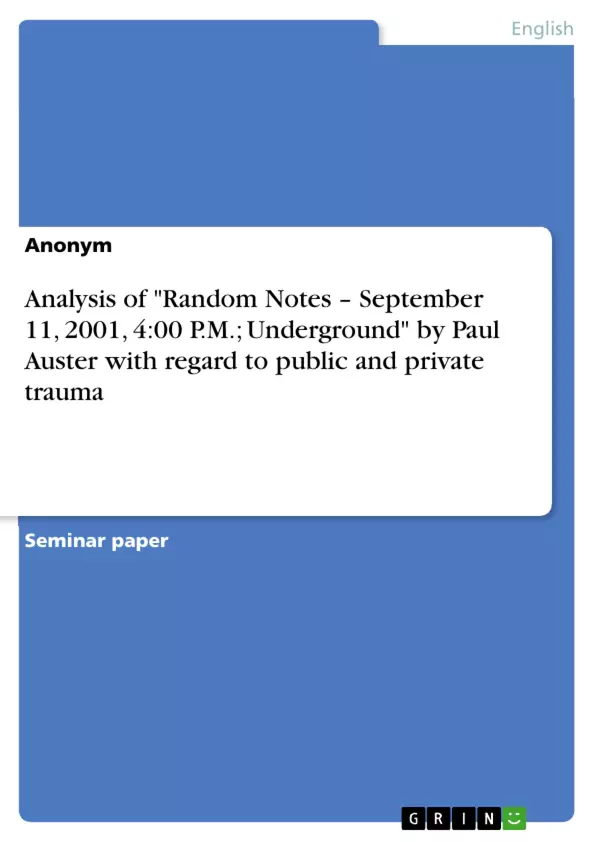We all know about the terrorist attacks on the 11th of September 2001. They were unprecedented in their magnitude and aftermath. In the wake of the attacks a huge amount of personal essays, political opinions and testimonials were produced by several novelists, short story writers, script authors, playwrights and artists. The need of not only reconstruction by engineers and clean-up crews but also stories that try to make the survival meaningful was discovered. A lot of authors try to find a meaning in the silence after the disaster and try to create an index to measure the absences that define New York.
In this seminar paper one of the above-mentioned short stories with the title Random Notes – September 11, 2001, 4:00 P.M.; Underground by Paul Auster with regard to public and private trauma will be analyzed.
In the New York Times Summary of Final Report the following has been written: “We call on the American people to remember how we all felt on 9/11, to remember not only the unspeakable horror but how we all came together as a nation – one nation.” (“Summary of the Final Report” 1)) where the American identity and the American sense of togetherness and the strong intention to defeat the terror and the trauma is shown. In this paper the aspects will be discussed, delimited and analyzed on the basis of Auster’s short story, published in Ulrich Bears 110 Stories on the 11th of September 2012, because he had an incredible gift of shaping the horrible disaster into words.
Before the 110 Stories had been edited by Ulrich Bear there was not any single collection that has recorded how New York writers of literary fiction, poetry and dramatic prose responded to the 11th of September. Ulrich Baer commented about his book:” The World Trade Center’s twin towers rose 110 stories high. Just as each of these 110 stories was filled with individuals of every stripe, the contributions in this volume represent the diverse […] texture of New York City.” (Baer 1) With regard to the horrific attacks also the American writer and director Paul Auster felt obligated to shape 9/11 into his own words, within his own story Random Notes – September 11, 2001, 4:00 P.M.; Underground. In his story Auster never had the intention to create an index to measure the absences that newly defined New York or to give a simple answer for the question “Why?”, rather he had the impression to catch the moment of 9/11.
Inhaltsverzeichnis (Table of Contents)
- Introduction
- General facts about Random Notes - September 11, 2001, 4:00 P.M.; Underground by Paul Auster
- The history of trauma theory
- Analysis of Random Notes - September 11, 2001, 4:00 P.M.; Underground by Paul Auster in regard to private and public trauma
- Conclusion
- Sources
Zielsetzung und Themenschwerpunkte (Objectives and Key Themes)
This seminar paper analyzes the short story "Random Notes - September 11, 2001, 4:00 P.M.; Underground" by Paul Auster with regard to public and private trauma. The paper aims to explore the ways in which Auster captures the aftermath of the 9/11 attacks and the impact they had on individuals and society.
- The impact of 9/11 on individual lives and personal narratives
- The role of trauma in shaping collective memory and identity
- The relationship between public and private trauma
- The challenges of representing and understanding a traumatic event
- The power of literature to confront reality and offer solace in the face of loss.
Zusammenfassung der Kapitel (Chapter Summaries)
The Introduction provides context for the analysis of Auster’s story, highlighting the widespread response to 9/11 in the form of personal essays, political commentary, and artistic expressions. It positions Auster’s work within this broader context and emphasizes the significance of exploring the event through literary means.
The section on general facts about "Random Notes - September 11, 2001, 4:00 P.M.; Underground" provides a detailed overview of the story's content, narration, point of view, and setting. The analysis delves into the narrative structure, the narrator's perspective, and the portrayal of New York City in the aftermath of the attacks.
The analysis of "Random Notes - September 11, 2001, 4:00 P.M.; Underground" in regard to private and public trauma examines the story's exploration of the individual and collective experiences of trauma. It explores how the narrator’s personal reflections and observations intersect with the broader social and political ramifications of the event.
Schlüsselwörter (Keywords)
The key terms and concepts explored in the paper include 9/11, trauma, collective memory, public trauma, private trauma, literary response, personal narrative, Paul Auster, "Random Notes - September 11, 2001, 4:00 P.M.; Underground," New York City, and the aftermath of the attacks. The paper investigates the intersection of these elements to understand the complex and multifaceted impact of 9/11 on individuals and society.
- Quote paper
- Anonym (Author), 2017, Analysis of "Random Notes – September 11, 2001, 4:00 P.M.; Underground" by Paul Auster with regard to public and private trauma, Munich, GRIN Verlag, https://www.grin.com/document/539810



